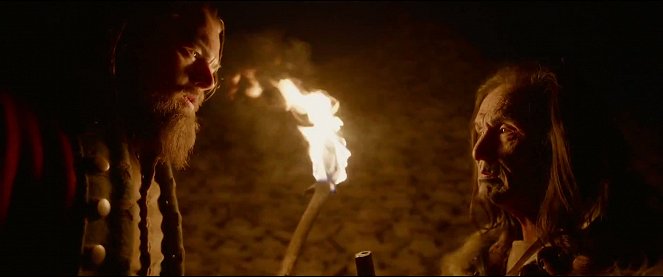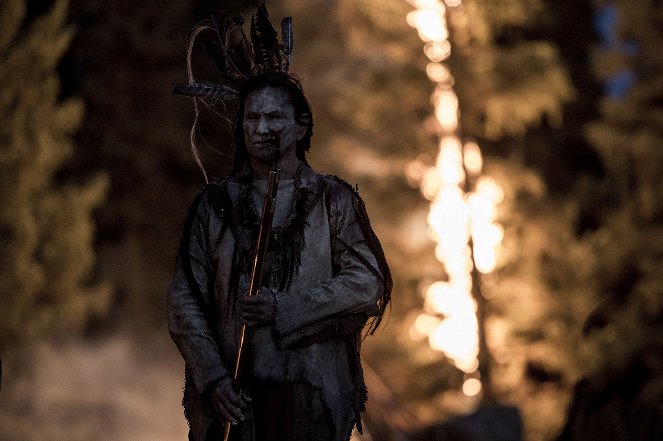Directed by:
Alejandro González IñárrituCinematography:
Emmanuel LubezkiCast:
Leonardo DiCaprio, Tom Hardy, Domhnall Gleeson, Will Poulter, Forrest Goodluck, Duane Howard, Arthur Redcloud, Melaw Nakehk'o, Grace Dove, Lukas Haas (more)VOD (5)
Plots(1)
Inspired by true events, The Revenant is an epic story of survival and transformation on the American frontier. While on an expedition into the uncharted wilderness, legendary explorer Hugh Glass (Leonardo DiCaprio) is brutally mauled by a bear, then abandoned by members of his own hunting team. Alone and near death, Glass refuses to succumb. Driven by sheer will and his love for his Native American wife and son, he undertakes a 200-mile odyssey through the vast and untamed West on the trail of the man who betrayed him: John Fitzgerald (Tom Hardy). What begins as a relentless quest for revenge becomes a heroic saga against all odds towards home and redemption. (20th Century Fox Home Entertainment)
(more)Videos (20)
Reviews (17)
In the same way that we talk about the “Hitchcockian” attributes of some thrillers and use the term “Lynchian” to describe weird films, we may soon find ourselves relating the name of Mexican director Alejandro González Iñárritu to movies around which media buzz is artificially created. As was the case with Birdman from the year before last, the hype that accompanies The Revenant is far greater than the attention that the film deserves based on its cinematic qualities. With their respective skills, the dream team of Iñárritu, Lubezki and DiCaprio could have made one of the most powerful adventure movies of recent years. Unfortunately, their straightforward B-movie plot couldn’t be “boosted” by the fluid camerawork, which performs even more captivating tricks than we could see in I Am Cuba (for me, the benchmark when rating films with sophisticated long shots). The story of a man chewed on by a bear, who returns “home” in the manner of Odysseus, is interspersed with mystical dream (hallucination) sequences, dialogue about God reincarnated as a squirrel and manifestations of the devastating nature of unregulated capitalism. Iñárritu, who always takes delight in the suffering of his characters, would be the ideal director for a raw western in the traditional mould, in which violence serves as the main means of communication, sets the action in motion, sets up the plot twists and solves problems. Unfortunately, as pointed out above, he decided to communicate meanings in ways other than through spectacular violence. With words, for example. The use of violence as a central narrative element is justified by its insertion into the unsteady framework of a family melodrama, enchanted by Indian mysticism. I am convinced that The Revenant would have been a tonally and rhythmically more balanced film if it had not so stubbornly pretended to have philosophical depth and tremendous spiritual reach. Unlike in the case of Tarkovsky or Malick, the spiritualism in this film is limited to empty words and unoriginal symbolism. The formalistic aspect is in no way uplifting. Besides the motif of the spiral engraved on the canteen, for example, the cyclical concept of time, which is inherent to the indigenous American population, only highlights the repetitiveness of the protagonist’s suffering. Otherwise, the film has a thoroughly standard structure, with precisely timed twists, conscientious utilisation of all motifs and a satisfying ending that leaves no essential question unanswered. It’s okay for one-dimensional characters to serve as tools for conveying information and pushing the narrative in the required direction, but I don’t think it’s okay if they serve no other purpose, despite the film’s attempt to use them to convince us of its own inventiveness and its commitment to a cause (in this case, the interests of Native Americans; see the documentary about the making of A World Unseen, which is basically very naïve anti-capitalist and environmentalist agitprop). For me, the most fitting metaphor for the film, which outwardly criticises pragmatism but is at the same time supremely pragmatic in the handling of its characters and themes, remains the gif of the lead actor as Hugh Glass buried alive, torn and broken, clawing for his dreamed-of Oscar with his last ounce of strength. 65%
()
(less)
(more)
Leo will finally get his Oscar. And not because he turned in a better performance than in The Wolf of Wall Street, but because of how much he had to suffer for it. Such a large-scale and, thanks to its locations and weather, true survival movie with a stellar cast and cinematography by Lubezki does not need a thicker plot. IT IS ENOUGH THAT IT EXISTS. Just like it is enough for the Eiffel Tower to just stand there. Because for several decades there will be no other filmmaking project of similar proportions. The funny thing is that The Revenant’s lack of a denser story is criticized by the same viewers who repeatedly went to see the over-filtered Mad Max: Fury Road, in which there is not a single real exterior and someone drives a car through the desert for two hours only to decide to turn around just before reaching their destination. The story of The Revenant is a continual struggle for survival. The betrayal of a friend, meeting a Native American with a bleeding heart, helping the defenseless innocent. And the consequences of all of this. Fate and our ability to influence it. Karma. And for us contemporaries, also the realization that while we hope to have a good time, people before us hoped to survive. Every day. The Revenant’s poetic passages are not pseudo-art; they are art for masses, similar to those of Ridley’s Gladiator, just less cheesy, because Iñárritu expects some development from the mass audience over a decade. Alejandro, it’s incredible what you’re willing to do (and risk) to shoot the hitherto unseen. Chivo, you are a god. Amazing sound and makeup. By comparison, Alive and The Edge become mere snowflakes in The Revenant, flying in the wind of Dances with Wolves. Thank you, cinematography, once again after a long time. This is what I live for.
()
As long as during the first 30 minutes we capture the amazing promo reel of Lubezki's camera, which equilibristically flows through the space between panoramic and contact shots, it's captivating. But then comes the need to tell a story and work with the characters, and the master of shallowness Alejandro is suddenly back with everything that it encompasses. The means of storytelling diverts attention from what is told to us. The film has an incredibly-compiled screenplay full of coincidences, which is supposed to be based on ultra-realism, but in fact is constantly slipping out of it towards an attempt at a metaphysical anti-western. The symbolic plane, the game with landscape and flashy symbols, is so superficial and clueless that it’s shameful. Although Leo breathes like a frightened mule and practices the crawling lessons he learned in The Wolf of Wall Street, he basically has no acting to do (I was almost sorry for him during the scene in the ruined temple). The film becomes a superficial high school exercise in Jack London's tenacity, which, thanks to a number of physical details, unfortunately grows into a parody of itself - Glass is Iron Man between trappers and Meresiev of the 19th century. It is not a celebration of the tenacity of man, but of the superfluous ego of a creator who puts himself above the story and the character as a dubious god. Revenant is a rare spectacle, an intellectual exploitation and a film that brings nothing more than magnificent filming of landscapes and action. Otherwise, it's a boring camping guide and a college of starting fires. Where there is nothing, not even the tinder burns. Metaphysics for the poor from the grizzly among the overrated filmmakers. P.S. The bear takes it all, the best CGI scene ever. [50%]
()
So intensely destructive that at the very end, I felt like Glass himself. Broken, torn apart, utterly ruined, down to the marrow and bone. But unlike him, I would give up practically instantly and just wait for death. He crawls, struggles, and in various croaky ways tries to reach his archetypal goal through Leonardo DiCaprio's thrilling interpretation, to the point where even the winter wind on the way back from the cinema felt like the most pleasant spring breeze. I love the classic concept of the western genre, but this turning of traditions upside down needs to happen once in a while in every genre. Especially when the key scenes (the she-bear, the river, the bisons) are already iconic images from the moment of their debut. A magnificent epic and the most intimate rebirth in one.
()
Stunning cinematography, atmospheric music, a great Tom Hardy and some riveting scenes. But if the protagonist crawling through the woods for those 156 minutes had been someone I cared even a little bit about, I probably would have had a lot more fun. A good and in some ways exceptional film that I never want to see again in my life.
()


